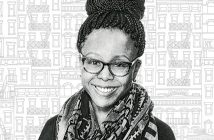Highlighting a key partner in the A2J Initiative at Fordham Law School
When it comes to housing in the country’s most densely populated big cities, a lawyer’s help can make the difference between a family sleeping in their apartment or spending many nights on the streets or in a shelter. But the harsh reality is approximately 90 percent of tenants facing eviction in the United States do not have legal representation. By contrast, nearly 90 percent of landlords in these same eviction cases do have legal representation.
In an effort to level the scales of justice, the city of New York recently launched a new initiative to remedy the gross imbalance, and a dedicated group of students, staff, and faculty at Fordham Law will play a key part.
The Housing Justice Initiative
On August 11, 2017, Mayor Bill de Blasio signed a pivotal new bill into law—Intro 214-B, or what advocates call Right to Counsel NYC. The law guarantees low-income families facing eviction free legal representation if they have a household income below roughly $50,000 for a family of four; those earning more may qualify for legal counseling. The program is rolling out by ZIP code and is expected to ultimately serve 400,000 New Yorkers a year.
The new legislation comes as the eviction crisis in America continues to spiral out of control. In 2016, nearly one million households were evicted. In 2017, economists estimated a staggering one in five renters across the country faced eviction adding to the 3.7 million who have experienced eviction in their lifetimes. These already staggering numbers belie a much starker reality, as a significant portion of evictions are never officially documented in court.
The effects of eviction on a family are devastating. Adults who have been evicted struggle to find jobs and housing. Their children often report increased feelings of alienation at school, see a precipitous drop in their grades, and are at higher risk of going to prison later in life.

While evictions are the result of several complex issues, one factor towers above them all: from 2010 to 2017, rents rose twice as fast as wages in New York City. Those with the least financial means, in the city’s lowest income bracket, were hit the hardest. For the poorest 20 percent of New Yorkers, rents have increased the most, proportionally speaking, among all income brackets, while their wages have increased the least. A similar trend persists throughout the country, especially in urban areas.
Legal representation is highly effective in keeping low-income families in their homes when facing eviction;
however, very few are aware of its benefits, and even fewer can afford it. But with the new law in place, New Yorkers facing eviction will soon have a powerful ally at their sides.
“Lawyers do a lot of things for tenants besides just [determining in court]whether or not they’re evicted,” John Pollock, the coordinator for the National Coalition of the Civil Right to Counsel, said in an interview with City Lab. “Some tenants … may not be able to stay in their units, but the attorney may be able to keep the eviction off their records.” Or lawyers, he added, “may be able to find them alternative housing. They may be able to get them into subsidized housing. They can arrange a soft landing in so many ways.”
Making Room for Housing Law
Tewari, who has volunteered in New York State Housing Court and has worked on high-profile rental housing cases for the Washington, D.C., Office of the Attorney General, underscores complexities of the eviction crisis.
“In the low-income community, there are other pressing issues that people are facing, and judges, advocates, and counsel need to be prepared to take that into account, not only in strategy but also with empathy,” she says.
to make her rent payments. Aside from the exhaustive physical toll the disease wrought on her body, Tewari’s client had to deal with court dates that often came into conflict with a series of surgeries and medical appointments. “It is devastating to witness the stigma weighing these persons down as soon as they are evicted and for reasons so often outside their control,” Tewari says.
Housewarming
Amid the heightened awareness and increased focus on housing law, the HJI officially launched on March
8, 2018. Fordham Law students packed the room to learn more about housing advocacy from a variety of experts in the field. Speaking at the launch were Right to Counsel NYC Coalition Coordinator Susanna Blankley, Flatbush Tenant Coalition Community Organizer Estefania Trujillo Preciado, and staff attorney for the Legal Aid Society and Fordham Law alumnus Robert Soriano-Hewitt ’11.
The three veterans of housing rights advocacy offered their unique perspectives and provided students with a glimpse into the many ways organizations are battling the eviction crisis. Blankley described the history of housing movements in New York City, the manner in which landlords conduct illegal and groundless evictions, and the strategies tenants have used to assert their rights.
Preciado followed with several personal stories from her work in housing advocacy, illustrating how for many New Yorkers housing is a matter of life and death. In a painful example, she told students how one elderly woman she worked with was evicted and, without a place to stay, soon died.
The different voices heard at the event, Horowitz says, “was an important picture to give for students. People were coming together, understanding, and starting to engage in this work.”
Since its official launch, the HJI has already paired 16 student mentees with alumni working in organizations such as the Urban Justice Project, Catholic Migration Services, and Housing Conservation Coordinators of New York City. Through the HJI, students have the chance to not only learn in an academic setting but also take advantage of hands-on opportunities in the field through fellowships in housing law, housing advocacy externships, and career counseling. This fall, the kickoff Pathways to Practice Panel, co-sponsored by the HJI, brought Fordham alumni Lenny LaBarbiera ’88, Lisa Lim ’90, and Kathryn Neilson ’06 to share with students their career paths in affordable housing law. “It was a joy to watch our students ask so many questions about how they can enter this field and to see the generosity of our alumni, staying well after the panel finished to mentor these students on lifetime careers in housing law,” Tewari says.
Perhaps the most notable quality of the HJI is that students have the chance to effect change on an immediate, tangible level. “Students experience the everyday work,” Horowitz says, “through externships, through internships, through volunteer work, and through collaboration with organizations that are working in housing advocacy.”
This on-the-ground education must be rooted in a legal framework, so students are encouraged to choose from any number of relevant courses, including Residential Landlord-Tenant Law, Affordable Housing, and the Law of the City of New York.
To supplement their classwork, students can pursue summer internships like the Kirpalani Summer
Fellowship in Housing Law, which offers a $4,500 to $5,000 stipend to do housing work at a nonprofit or government agency for the summer. Other opportunities for fieldwork include Bronx Legal Services or Housing Conservation Coordinators, Inc., where students have direct contact with clients, shadow attorneys in court, assist with pre-litigation advocacy to prevent landlords from bringing eviction proceedings, and work with tenant organizers. When they are ready, students are encouraged to apply for a job in the field.
With the Right to Counsel now in effect, both Horowitz and Tewari emphasize the many great opportunities
now available for young attorneys in New York City. Legal Aid Society, Legal Services NYC, NYLAG, and the LEEAP Coalition are all looking to hire full-time housing attorneys. HJI participants will be well prepared to act with knowledge and compassion in addressing one of New York City’s most pressing issues.




